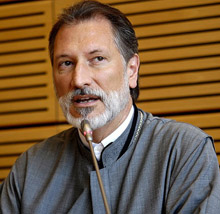The Church: A Pillar which gathers the serbian faithful
An overview of the relationship between the Serbian Diaspora and the Serbian Orthodox Church
To effectively consign to writing a word on the history of the Serbian Diaspora, from the first Serbian immigrants to the final emigrant waves, is in fact to note the efforts and endeavours of a people, of individuals and their communities, who through their common union and common experience desire to create, and often recreate, stabilise and develop a new life; one which will retain for posterity the essential elements of their former lives and experiences, as for their generation so also for succeeding generations.
Our first Serbian immigrants sought after the creation of a new life and a new home in every sense of the word: a place to give birth, to raise children and provide them with an adequate education – such, that would emphasis the new as much as preserve from forgetfulness the old. They built churches and monasteries, common homes in which they could maintain their ancestral faith and secure places of worship, becoming a part of sacred history. Following which they provided church and language schools and folkloric groups, to insure the continuity of their traditional religious and cultural heritage, thereby maintaining their identity. Equally as important, they established retirement settlements to secure a dignified life for the elderly and cemeteries as a final resting place in anticipation of the Age to Come.
The contemporary history of the Serbian Diaspora is relatively new and begins at the inception of the 19th century. All of these new lands represent a sharp contrast which, compared to old war torn and ideologically burdened regions, is reflected in the vitality and youthful energy of the newer nations. Our Serbian history in the Diaspora is one which is intrinsically woven into the very fabric of these fledgling nations, equally as in the “comfortable” historic fabric of the Serbian nation and the Serbian Orthodox Church, which is the pillar of Serbian life in the Dispersion.
The Serbian community on the North American Continent was initiated with the first arrivals from the Austro-Hungarian Empire; while on the Fifth Continent, as well as in Europe, the majority began with the arrival of the first emigrants following World War II. It began with Serbs who were tired and worn, some of them even entirely devastated, searching for a new home and a new, more secure future. Their task was, and remains for us today: how, as with all Diaspora communities, to accept the culture and traditions of their new homeland, without forgetting or betraying those of their Fatherland which many have left behind, never again to return?
Our history, which among the Serbs of the Dispersion continues with generations which were born in the Diaspora, thereafter enriched with a newer, more educated, economic emigration through the phenomenon of „gastarbeiters“, i.e. “temporary foreign workers” and again renewed with the arrival of expellees from war ravaged regions, is one grateful for its new chance at life and filled with inspiration for that which until recent were only unimaginable opportunities. This is the history of our people and our Church which has entered into a new nation and a new era. Inherent is that vital link, precisely that which our “fathers of the Diaspora” recognised in their hearts: that faith can endure without freedom; while freedom cannot survive without faith.
Through the Church we are transported beyond time and history in the presence of the “Eternal Now”. This is a new reality, something which is at the same time vastly familiar, yet one which is constantly moving and progressing, changing and developing. Our history is therefore not a stagnant history, rather one which is exuberant and is constantly vivified. The Lord has elected where to plant His Vineyard, through which He will continue to bestow upon us His inheritance and prosperity for the good estate of His Holy Church. For He is the Lord of time and seasons, the Author of History and histories, both in History and beyond all histories, sacred and profane.
+ IRINEJ
Bishop of the Metropolitanate of Australia and New Zealand
The Serbian Orthodox Church
August 2011, SYDNEY


